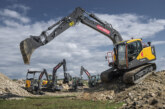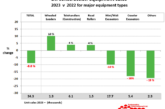BAM Nuttall and Trackunit hosted the first Eliminate Downtime industry conference to openly share experiences of costly downtime across the construction value chain and advance solutions to increase productivity, safety and profitability. This was the first audience event in the calendar for the Eliminate Downtime movement, with its goal of completely eliminating downtime in the construction industry by 2025.
Invited speakers included construction companies, machine rental organisations and digital transformation businesses:
Stephen Jarvis, BAM Nuttall
Soren Brogaard Jensen, Trackunit
Chris Matthew P.Flannery Plant
Colin Evison, BAM Nuttall
Simon Beckett, Nationwide Platforms
Ryan Pike, Plantforce Rentals
The event at BAM Nuttall’s extensive site office on London City Airport’s £200m redevelopment project, and was an apt venue considering the content and audience. The welcome by Stephen Jarvis, director of Plant and Fleet at BAM Nuttall, reminded the audience that machine technology is already a key element in advancing the industry. He reiterated how solutions have leapt forward from simply preventing theft, through reducing unauthorized use, to effecting behavioural change on site and through the supply-chain. He stated. “Our job is to construct assets which change people’s lives and make them better. To do this we need to be innovative and be brave in sharing information and we need to learn collectively”.
Each speaker expanded on the theme and their presentations highlighted personal experiences of similar industry failings, while their solutions demonstrated the importance of collaboration, open communications and redesigned processes. All the speakers concurred that the industry must not ignore personal achievements, such as staff training, development and incentivised technology uptake, which together help improve complex working environments.
An example from a major hospital redevelopment project stressed how a lack of continuous oversight enabled unauthorised machine use, often by untrained personnel which led to damaged and misplaced equipment. This failure impacted the productivity of the hired machines and their operators. Unauthorised use also meant daily maintenance procedures were not followed. This led to a large rise in breakdowns, many caused by flat batteries. As a result, more machines were brought on site, which increased costs, while added congestion into an already busy site. The change-around came when all MEWPs were fitted with telematic devices which heighten security, location tracking and machine diagnostics. An enclosed onsite stock area with additional charging points was created and better coordinated multiple machine delivery processes implemented. The result was reductions in unauthorised use, less theft, a 10-percent fall in breakdowns, and on the personal level operators gained a greater feeling of machine ownership.
Soeren Brogaard Jensen, Trackunit, commented, ‘Previously there were individual solutions for the same problem in every company. Varied closed development platforms meant that clients were trapped in expensive technology solutions that often did not achieve their goals. Today, all this has changed. Open software and the mobile app culture are influencing connected applications across sour industry. Solutions now support companies, contractors and individuals in best practice techniques in the office, on the road, as well as on site. This new collaborative approach is changing our industry, for the better.’
The movement to Eliminate Downtime has already received the support and sign-up from leading construction companies, whilst dates for industry forums around the globe, including Chicago, New York, Paris (France), Munich (Germany), Amsterdam (NL) and Copenhagen (Denmark) have been set.









